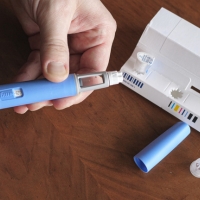Feature
Combining Screening, Brief Intervention, and Referral to Treatment With Recovery Management in Primary Care Settings Improves Outcomes

Alcohol screening, brief intervention, and referral to treatment (SBIRT) can be an effective method for identifying persons either at risk for or with alcohol-related problems and for connecting them to treatment. Recent data suggest, however, that while screening for alcohol misuse is common in primary care and other health care settings, patients are less likely to be provided a brief intervention for problematic drinking and even more unlikely to be referred to or receive treatment for alcohol use disorder (AUD).1,2,3 For individuals who do receive treatment, preventing relapse and sustaining recovery are major concerns. New National Institute on Alcohol Abuse and Alcoholism (NIAAA)-supported research, published in the journal Alcohol: Clinical and Experimental Research, reports that combining SBIRT with recovery management in primary care settings increases the likelihood that patients receive treatment for alcohol and other substance use disorders (SUD) and reduces substance use over a 12-month period.4
In the study, investigators with Chestnut Health Systems’ Lighthouse Institute conducted a randomized controlled trial to evaluate the effectiveness of SBIRT plus recovery management checkups for primary care (RMC-PC) compared to SBIRT only. The recovery management checkups (RMC) intervention directly links patients to treatment, ensures they engage in treatment, and promotes recovery through regular checkups and early interventions that detect relapse early and reduce the time to re-entry of treatment. A previous pilot study examining the efficacy of RMC for patients who had received SBIRT in primary care demonstrated higher rates of SUD treatment entry and more days of receiving treatment compared to SBIRT only.5
In the current study, the researchers followed 266 participants at four primary care sites (federally qualified health centers) to evaluate treatment and substance use outcomes over a 12-month period. Participants in the SBIRT plus RMC-PC group received quarterly checkups, and participants in both the SBIRT plus RMC-PC and the SBIRT-only groups were assessed quarterly. The findings showed that participants who engaged in the combined approach were nearly four times more likely to start treatment for AUD and other SUDs and achieve sustained recovery. In addition, participants who received SBIRT plus RMC-PC reported a significant increase in the number of days that they received treatment during the year. They also reported a decrease in the number of days that they used alcohol or cannabis as well as an increase in the number of days that they abstained from alcohol and other substances.6,7
The study findings reinforce the critical role of primary care in identifying and intervening with alcohol and other substance-related problems, and in providing continuous support to improve treatment and recovery outcomes.8
References:
1 Mintz CM, Hartz SM, Fisher SL, Ramsey AT, Geng EH, Grucza RA, Bierut, LJ. A cascade of care for alcohol use disorder: using 2015–2019 National Survey on Drug Use and Health data to identify gaps in past 12-month care. Alcohol Clin Exp Res. 2021 Jun;45(6):1276-86. PubMed PMID: 33993541
2 Glass JE, Hamilton AM, Powell BJ, Perron BE, Brown RT, Ilgen MA. Specialty substance use disorder services following brief alcohol intervention: a meta-analysis of randomized controlled trials. Addiction. 2015 Sep;110(9):1404-15. PubMed PMID: 25913697
3 Kim TW, Bernstein J, Cheng DM, Lloyd-Travaglini C, Samet JH, Palfai TP, Saitz R. Receipt of addiction treatment as a consequence of a brief intervention for drug use in primary care: a randomized trial. Addiction. 2017 May;112(5):818-27. PubMed PMID: 27886657
4 Scott CK, Dennis ML, Grella CE, Watson DP, Davis JP, Hart MK. A randomized controlled trial of recovery management checkups for primary care patients: Twelve-month results. Alcohol Clin Exp Res (Hoboken). 2023 Oct;47(10):1964-77. PubMed PMID: 37864532
5 Scott CK, Grella CE, Dennis ML, Nicholson L. Linking individuals with substance use disorders (SUDs) in primary care to SUD treatment: the Recovery Management Checkups–Primary Care (RMC-PC) pilot study. J Behav Health Serv Res. 2018;45(2):160-73. PubMed PMID: 29181779
6 NIAAA [Internet]. NIAAA recovery research definitions. [cited 2023 Oct 20]. Available from: https://www.niaaa.nih.gov/research/niaaa-recovery-from-alcohol-use-disorder/definitions
7 NIAAA [Internet]. News release: NIAAA scientists unveil new definition of recovery from AUD. 2022 Apr. 27. [cited 2023 Oct 20]. Available from: https://www.niaaa.nih.gov/news-events/research-update/niaaa-scientists-unveil-new-definition-recovery-aud
8 NIAAA [Internet]. Alcohol Treatment Navigator. FAQS on recovery and continuing care. [cited 2023 Oct 20]. Available from: https://alcoholtreatment.niaaa.nih.gov/FAQs-searching-alcohol-treatment#recovery
Also in this issue…
News from the Field
Noteworthy
Noteworthy










